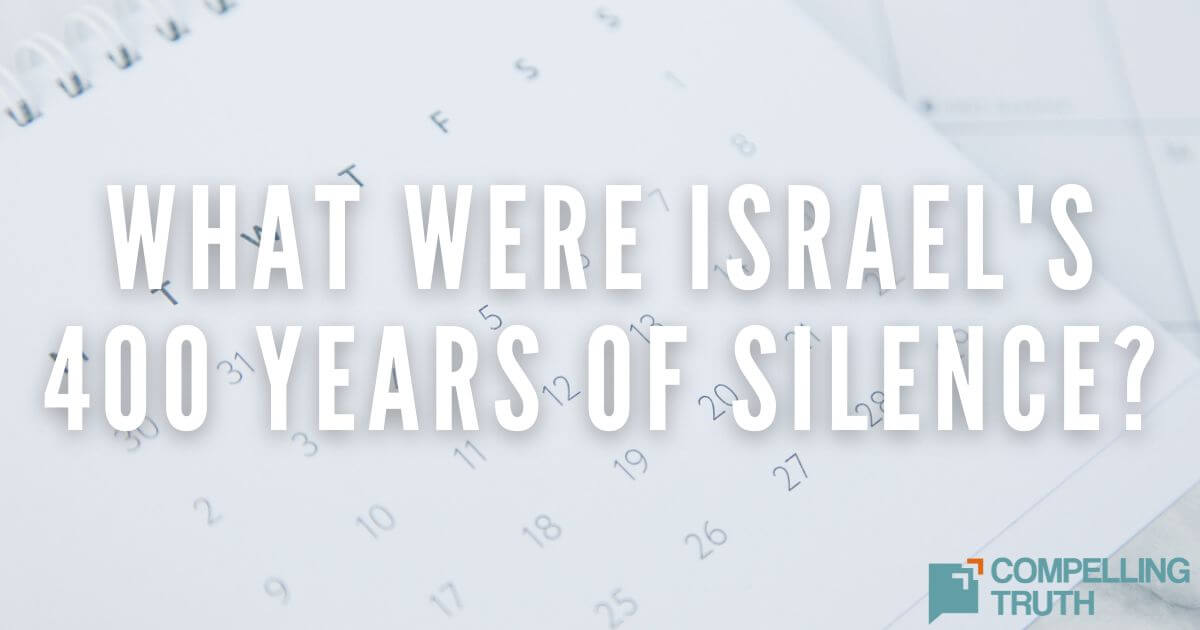The intertestamental period, or the time "between the testaments," occurred between the end of the writing of Malachi in the Old Testament and the beginning of the events described in Matthew in the New Testament. This was a period of about 400 years and is also known by some as the "400 years of silence." During this time, the nation and people of Israel changed politically, religiously, and socially. Daniel (chapters 2, 7, 8, and 11) predicted much of what happened.
The changes culminated with the arrival of Jesus, the Messiah, who declared that He was the Savior, One with God, and then backed up His claims by resurrecting from the dead after a horrific execution.
During the 400 years before Jesus, God was silent in the sense that He did not give a prophetic word to His people, but He was actively carrying out His plan to deliver a Messiah for all people.
The Persians ruled from about 532—332 BC. They had allowed the Jews to practice their religion and rebuild the temple (2 Chronicles 36:22–23, Ezra 1:1–4). Alexander the Great defeated Darius of Persia and introduced Greek rule. Alexander required Greek culture to be taught and followed in all conquered lands. He allowed religious freedom, but promoted Greek lifestyles. The Hebrew Old Testament was translated into Greek (the Septuagint), but the ungodly and humanistic Greek culture also pervaded society.
When Alexander the Great died, the region where Israel resided, known as Judea, was then ruled by a series of men until Antiochus Epiphanes took over in about 175 BC. Epiphanes did not allow religious freedom. He overthrew the line of the priesthood and went so far as to desecrate the temple with unclean animals and a pagan altar (Mark 13:14). The Jews eventually revolted, restoring the lineage of the priesthood and the temple. Violence, war, and infighting characterized the period that followed.
Pompey of Rome conquered the region in about 63 BC and put the Caesars in charge. Eventually the Herod dynasty was appointed rulers over Israel by the Roman emperors and senate. The Herods were responsible for carrying out the Roman tax gathering and ruled over the Jews and other residents of Judea. Several Herods are mentioned in the New Testament—Herod the Great who attempted to have Jesus killed as a child (Matthew 2) and Herod Antipas to whom Jesus was sent during His trials prior to His crucifixion (Luke 23). In this time, Jewish, Roman, and Greek cultures created a mishmash in society. Jesus would be killed by a Roman means of execution—the cross.
Religiously, Israel had become dominated by the Pharisees. The Pharisees expanded the law of Moses to include their own interpretations and additions which they saw as equally important, or even more important than the original law handed down by God (Mark 7:1–23). Their devotion to the law was lambasted by Jesus, who charged them with dispassion and legalism. The Pharisees shared religious leadership with the Sadducees, who followed and admired the Greeks, rejected all but the Mosaic books of the Old Testament, and taught against the resurrection.
Jew and Gentile alike were becoming dissatisfied with religion. Greeks and Romans could obtain the Hebrew Scriptures in their own languages and began to question their mythologies and polytheistic beliefs. The Jewish people had been conquered and oppressed and became despondent. Hope was not in high supply and many looked for the Messiah who was foretold in the Old Testament, convinced His coming was the only thing that could save them.
The Old Testament records God's creation and His actions to establish a relationship with His people. It foretells the coming of a Savior, a Messiah, who would save all people. When the prophetic words from God ceased for 400 years before Jesus was born, God was still at work preparing the way, carrying out His plan for Jesus. The New Testament tells His story and the beginning of the church. Jesus was recognized by the Roman centurion, the wise men, the Pharisee Nicodemus, Joseph of Arimathea, Mary Magdalene, and many others as the fulfillment of the prophesies about a Messiah.
The changes culminated with the arrival of Jesus, the Messiah, who declared that He was the Savior, One with God, and then backed up His claims by resurrecting from the dead after a horrific execution.
During the 400 years before Jesus, God was silent in the sense that He did not give a prophetic word to His people, but He was actively carrying out His plan to deliver a Messiah for all people.
The Persians ruled from about 532—332 BC. They had allowed the Jews to practice their religion and rebuild the temple (2 Chronicles 36:22–23, Ezra 1:1–4). Alexander the Great defeated Darius of Persia and introduced Greek rule. Alexander required Greek culture to be taught and followed in all conquered lands. He allowed religious freedom, but promoted Greek lifestyles. The Hebrew Old Testament was translated into Greek (the Septuagint), but the ungodly and humanistic Greek culture also pervaded society.
When Alexander the Great died, the region where Israel resided, known as Judea, was then ruled by a series of men until Antiochus Epiphanes took over in about 175 BC. Epiphanes did not allow religious freedom. He overthrew the line of the priesthood and went so far as to desecrate the temple with unclean animals and a pagan altar (Mark 13:14). The Jews eventually revolted, restoring the lineage of the priesthood and the temple. Violence, war, and infighting characterized the period that followed.
Pompey of Rome conquered the region in about 63 BC and put the Caesars in charge. Eventually the Herod dynasty was appointed rulers over Israel by the Roman emperors and senate. The Herods were responsible for carrying out the Roman tax gathering and ruled over the Jews and other residents of Judea. Several Herods are mentioned in the New Testament—Herod the Great who attempted to have Jesus killed as a child (Matthew 2) and Herod Antipas to whom Jesus was sent during His trials prior to His crucifixion (Luke 23). In this time, Jewish, Roman, and Greek cultures created a mishmash in society. Jesus would be killed by a Roman means of execution—the cross.
Religiously, Israel had become dominated by the Pharisees. The Pharisees expanded the law of Moses to include their own interpretations and additions which they saw as equally important, or even more important than the original law handed down by God (Mark 7:1–23). Their devotion to the law was lambasted by Jesus, who charged them with dispassion and legalism. The Pharisees shared religious leadership with the Sadducees, who followed and admired the Greeks, rejected all but the Mosaic books of the Old Testament, and taught against the resurrection.
Jew and Gentile alike were becoming dissatisfied with religion. Greeks and Romans could obtain the Hebrew Scriptures in their own languages and began to question their mythologies and polytheistic beliefs. The Jewish people had been conquered and oppressed and became despondent. Hope was not in high supply and many looked for the Messiah who was foretold in the Old Testament, convinced His coming was the only thing that could save them.
The Old Testament records God's creation and His actions to establish a relationship with His people. It foretells the coming of a Savior, a Messiah, who would save all people. When the prophetic words from God ceased for 400 years before Jesus was born, God was still at work preparing the way, carrying out His plan for Jesus. The New Testament tells His story and the beginning of the church. Jesus was recognized by the Roman centurion, the wise men, the Pharisee Nicodemus, Joseph of Arimathea, Mary Magdalene, and many others as the fulfillment of the prophesies about a Messiah.



